CinefestOz 2018 Film Festival Report: Reaching Distance & Documentaries
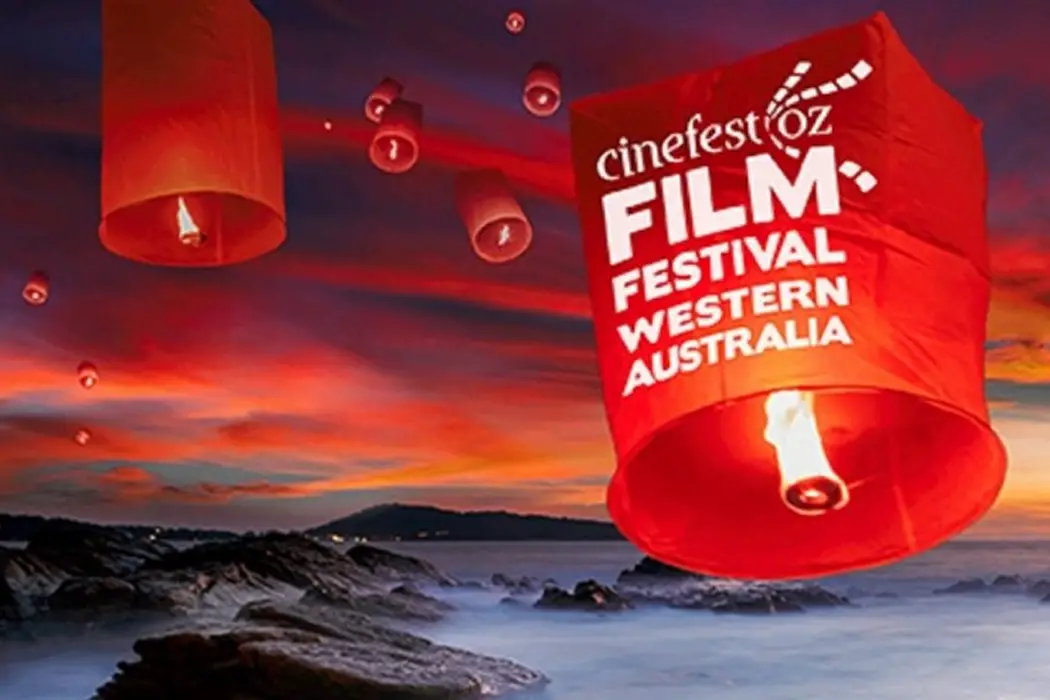
Alex is a 28 year-old West Australian who has a…
Outside of the hundreds of shorts, documentaries and feature films that play every year at CinefestOZ, one of the major appeals of attending the regional festival are its industry events, which include daily “In Conversation” lunches, which are interactive Q+A’s that mix intimate conversations with the people behind each of the film prize contenders within the scenic landscapes and fine dining of Western Australia’s prime wineries (The Jirga lunch was particularly enlightening in detailing the startling production problems that its director, Benjamin Gilmour, suffered to create the CinefestOZ prize-winning film).
Within my 5 day attendance of the packed festival, I was fortunate enough to attend some of these excellent film-making forums, and in-between them (and my nights watching their corresponding films), time for watching anything else was quite limited. Luckily I managed to squeeze a quartet of titles, a diverse mix of modern Australian social realism, cerebral drama and illuminating documentaries.
I missed out on Dying to Live, In Like Flynn and The Eulogy, but I do hope to cover them in the future, as the Australian film industry is in such an incredibly interesting place right now, thanks to the potentially huge new releases of The Nightingale, Hotel Mumbai and I Am Mother, my anticipation for Australia’s release schedule for the next six months is at an all-time high (the optimistic excitement about these upcoming movies from the industry professionals I met also helped booster this hopeful feeling).
West of Sunshine (Jason Raftopoulos)
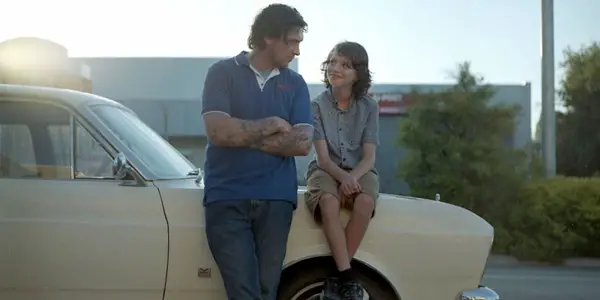
It’s quite fitting that West of Sunshine debuted at the Venice Film Festival last year, as it owes a considerable debt to Italian cinema, most notably their Neo-Realism film movement of the 1940’s. Popularised by Vittorio De Sica’s Bicycle Thieves (which is given a sly nod in this film), they were somber dramas set amongst the impoverished and hard-working blue collar class, shot on real locations with non-professional actors, all elements which are present in Jason Raftopoulos’ Melbourne-set debut.
Instead of a father and son looking for their stolen bicycle, we have Damian Hill as Jimmy, the mechanic-turned-postal courier who is having one hell-of-a-day thanks to the local loan shark, who has given him one day to pay back his hefty $15K debt, a task complicated by having to look after his young son Alex (Tyler Perham, Hill’s actual stepson).
Bouncing between mail drop-offs in his beloved antique car, Jimmy tries to juggle his quest to square his debt and the need to entertain his child whilst feeding the crippling gambling addiction that got him into this situation in the first place. His destructive obsession is epitomised in one heartbreaking sequence where he wins enough money to save himself in just one round of dog-racing, only to lose it all in the next, involuntarily following the natural progression of the common compulsive gambler.
Despite all the debts he must clear, it is the one owed to himself that is revealed to be the most considerable one, an emotional deficit left by his own father which has caused him to follow in his exact footsteps; a vicious cycle of negligence and addiction that Jimmy is on the verge of passing down to his precious son, because as everyone they bump into notes “he looks just like you”. Poor parenting can create poor parents.
Despite this, Jimmy is not without sentiment, as he clearly loves his son, pines for his lost wife and all of his regular clients are always happy to see him, a range of different personalities who deliver natural performances that add a strong sense of verisimilitude to the unfolding turmoil. When a quick and easy fix is offered to help Jimmy early on (sell his vintage vehicle), the need for the script to have him reject it in favour for exploring other possible solutions undercuts the drama when the easiest and stress-free escape from his self-made financial problems sits (literally) right underneath him.
This narrative contrivance bleeds into the third act, when Jimmy, in an act of desperation, is forced to become a much different type of courier (think little white bags). Unlike Bicycle Thieves’ naturalism, this is relentlessly didactic in its realism, concluding in an anti-climactic gesture that suggests that this tale could’ve been told within a short film format. Even with its short 78 minute runtime, it still feels padded out, thanks to repetitive driving montages and inconsequential character interactions as Jimmy fruitlessly scrapes for cash, with every request matched with a less-than-credible promise.
The endearing dynamic between the central father and son isn’t enough to disguise the frailty of this material, as it lacks any continuity of suspense or the urgency necessary for hard-hitting stories like this – like Jimmy, it ain’t all bad, just flawed.
Reaching Distance (David Fairhurst)
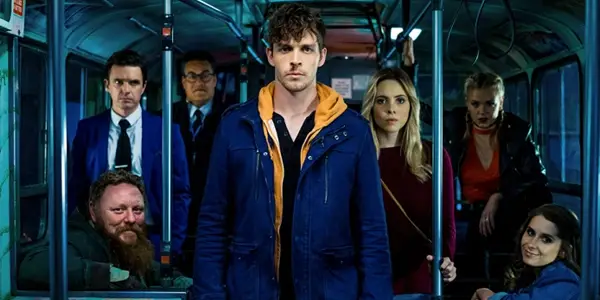
One of CinefestOZ’s great benefits is that it allows young and emerging filmmakers to launch their new releases alongside the major titles, allowing unknown indies to gain an audience with both industry professionals and regular patrons, which can genuinely help build word-of-mouth – an essential tool for any non-studio film trying to make itself known nowadays.
Last year, I managed to catch a handful of promising premieres, ranging from the terrible (The Butterfly Tree), the frustrating (Rabbit) and the surprising (Otherlife, which scored a Netflix release). So when the offer to see David Fairhurst’s self-financed debut Reaching Distance came through, I was initially hesitant. With little-to-no knowledge of what it was outside of its vague premise, just like any festival, there’s always an unbiased level of both doubt and excitement and yes, I will admit, its first 10 minutes did have me worried.
This is not to suggest that the beginning is terrible, but it does feature all the hallmarks of the “ambitious but intellectual low-budget feature” that I’ve seen so many times before; actively attacking the senses in order to disguise a shallow or non-existent plot, methodical dialogue that matches every verbal barb with some philosophical musing, delivered by a troubled male protagonist who suffers from severe psychotic issues (and nosebleeds). These formulaic traits are established when, waking up on the back of a bus, an old-school beast covered in graffiti and the usual cast of characters one might expect to see on a late-night shuttle run, Logan (Wade Briggs), dishevelled and confused, reveals himself to be clearly on this ride for nefarious reasons.
Armed with a silver switchblade, he spots the blue-suited businessman Martin (Matt Day), who we quickly learn, was involved in a car accident that caused the death of Logan’s twin sister Chell (Giselle van der Wiel). But before he can get his revenge, he’s looped right back to rear of the bus, and again and again, until the confused passenger realises that something, outside of the notion of his lethal vengeance, is obviously not quite right (Options of it being either a “Weird sex dream or Deja Vu?” is pitched by Morgan Griffn).
It might sound like a straight-up sci-fi infused Groundhog Day rehash, but Fairhurst’s screenplay is quick to reveal what’s actually happening, which I won’t spoil – except that this scenario is all (for the most part) happening within Logan’s mind, a man who suffers with the condition of hypermnesia (an enhanced photographic memory). Once again, having all the action be a “dream” is incredibly cliched, but thankfully it’s merely the setup for the drama, rather than a climactic twist to trick the audience (the opening is so dynamically abstract that any other answer apart from “it’s all in his head” never seems plausible).
The energetic performance by Wade Biggs and the thematic underpinning of his experience, growth and realisation of the problems relating to his introverted behaviour, help this film from becoming the aesthetic-driven but narratively-barren calling card exercise that I feared it might’ve been.
A surface-level autopsy of Reaching Distance would compile a comprehensive list of the Criterion Collection’s greatest hits; the fantastical exploration of existential trauma of Michel Gondry (Eternal Sunshine of the Spotless Mind in particular), Danny Boyle‘s hyper-stylized frenetic attitude and the low-budget innovation of Shane Carruth, all held together with the fabric of films like Jacob’s Ladder, The Matrix, The Incident and most surprisingly It’s A Wonderful Life (which is where the lovely Eddie Baroo comes in), especially in its quieter moments when it develops a tenderness that is quite unexpected. Three Colours: Blue on a Bus doesn’t exactly sound like compelling material, but Fairhurst’s determinedly stylistic approach makes it more then a mere product its cinematic ingredients.
A particularly admirable aspect is its inventive flashback sequences, as Logan’s constant trips through his narcissistic history never leave the bus’s automative restrictions. Instead, his key memories are recreated within the claustrophobic confides, which when implemented, are genuinely innovative (these moments are when the aura of Gondry’s scrapbook sensibilities are most evident). This is helped by Laura Murray’s lush but economical production design and Goldie Soetianto’s agile cinematography, whose work keeps the visuals consistently compelling, a real challenge especially when working in such a limited physical space.
As Logan comes to terms with his past altercations, the inside of the bus is transformed into a Baz Luhrmann-worthy New Years party, a radiant aquarium and even a movie theatre, where the contentious topic of people talking during movies is given a terse debate from our volatile protagonist. Despite my initial facetious reaction, David Fairhurst’s alternative take on the road to redemption, despite its brief stops, manages to make its destination.
Undermined: Tales From the Kimberly (Nicholas Wrathall)
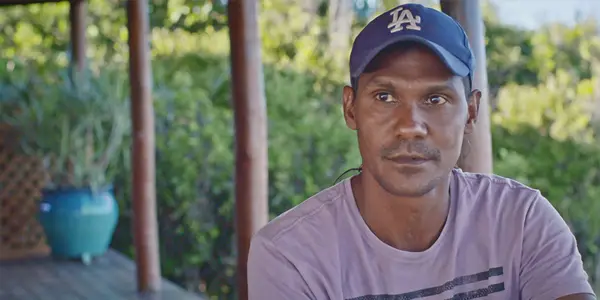
The world-famous Kimberly region of Australia, settled in the northern section of Western Australia, contains the top 4% of the most intact coast lines on the planet but lives under threat from mining corporations, the government and Asian investors. Undermined: Tales from the Kimberly, Nicholas Wrathall’s crucial coverage of the crisis, is an urgent investigation into what this means for the indigenous Aboriginal communities who live there, on both a micro and macro level. Due to the Kimberly’s untouched abundance of natural resources, it’s highly sought-after territory, but luckily they’re still held by their traditional Aboriginal owners, a clash that’s coming closer to conflict as eager companies are doing anything they can to make their money – no matter what the cost.
Mixing archival footage, Mark Jones’ serene drone footage and candid talking head interviews, Wrathall delivers the potent information clearly and concisely, detailing the issues with an assured sincerity that makes this accessible for all audiences. The American Dakota Access Pipeline protests from 2016 share a strong similarity to the Australian James Price Point Protests from 2008 (which is revisited here), a fierce fight that initially brought to light (for most people) what was happening in the Kimberly, and 10 years later, still hasn’t stopped.
As the title suggests, Undermined: Tales of the Kimberly weaves multiple stories from the affected region in order to paint the bigger picture, starting off with Kevin Oscar, the station manager (and Bunuba Traditional Owner) of the Leopold Trade Station. The farm owner was proposed a joint venture with the Eastern Gumura Pastoral Company, because as their representative notes, joining a mining corporation is “an inevitability” rather than a choice, a sad fact which becomes one of Wrathall’s key messages.
Shot over three years, we witness as this partnership falls apart and how the Pastoral Company’s aggressive tactics have irreversibly damaged other indigenous farms in the past, vast estates staffed by people who just wish to stick with their rightfully-owned land, which as one of the interviewed respondents poignantly points out, feels like a “continuation of the colonial past, taking back land rights for economical benefit”.
The heart of the film lies with the charming conservationist Albert Wiggins, whose work in indigenous science has started to detail just how severely the mining and fracking has negatively changed the land and its people. This includes irritated agriculture and the displacement of many Aboriginal people, forced to transfer into government-created remote communities, away from their homes and left with no jobs or future prospects (one case involved 150 Oombulgurri residents relocated, which lead to cataclysmic results). Due to this, the traditions of many Aboriginal clans are beginning to be lost on the young, which leads to Wiggins, who nearly lost his connection with the land after a youth spent in a suburban school system, who continues to passionately fight to keep his heritage alive for the next generation.
His earnest efforts to do so are infectiously endearing, and it’s immediately understandable why Wrathall and his team chose to use him as one of the main subjects. Undermined effectively depicts and analyses the tensions arising from greed and the exploitation of people who just wish to keep what’s rightfully theirs, thoroughly disputing the common rumour that everything about remote Aboriginal communities is bad. It’s the mining corporations and the government’s lax treatment of these indigenous-related issues that is the real problem, not the victims who are stuck in-between it all.
The Coming Back Out Ball Movie (Sue Thomson)
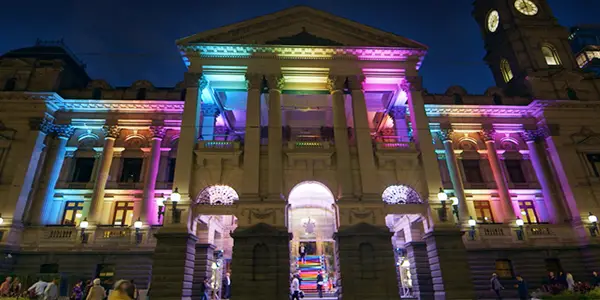
As the final film for both this year’s CinefestOz and Melbourne International Film Festivals, The Coming Back Out Ball Movie is a perfect choice to conclude the cinematic celebrations with, a pleasant ending given by Sue Thomson’s breezy but beautifully observed appreciation of Australia’s elderly LGBTIQ+ community. The Coming Back Out Ball was a gala held in October last year, a colourful occasion where people of all sexualities and dance abilities were welcome, occurring just two weeks before Australia finally voted yes on the gay marriage verdict.
The free event was created to celebrate and honour LGBTIQ+ elders, because, as the event’s organiser artist Tristan Meecham proudly states on the night, “This is for those who have allowed me to stand upon this stage with 6 inch heels and gold finger paint”. It’s not only a time for these people to come out freely as queer, but also as seniors, as many older citizens suffer from self-isolation and health issues, growing up in a generation where they had to fight for their gender and sexuality, often imprisoned, assaulted or ostracised for simply being who they were.
As the documentary follows Meecham’s dedicated planning for the ambitious ceremony, we meet 12 of the elders who plan to attend the night, a series of intimate portraits that are both heartwarming and heartbreaking, all representing the different areas of the LGBTIQ+ community. Highlights include the courageous Ardy Tibby (who wears her “This Is What An Old Lesbian Looks Like” shirt with a stoic pride) and David Morrison, the model train conductor who has the smoothest moves both on and off the dance floor. The subjects range from former doctors, sheep shearers and soldiers, who, as lesbian, gay, trans, bisexual and intersex (and more) people, were forced to deal with the guilt, the prejudices and struggles of growing up queer in a society that openly rejected them (and in some circumstances, still do).
It may be touching and tragic stuff, but Thomson handles the material with a light touch, allowing the various enlightening personalities to really take control of their own narratives. Much like the ball, her work is a celebration of these people, focusing on their passion rather then their pain, a mood kept upbeat by Mark D’Angelo’s catchy score. Held in Melbourne’s Town Hall, the large civic centre was packed with a 30-piece orchestra and hundreds of attendees, both young and old, with the night’s concert effectively recorded by Sky Davies and Richard Kickbush.
Filled with live performances, vocal tributes, dancing and more, it’s difficult not to watch Meecham and his collaborative partner Bec Reid’s hard work pay off without gaining a big smile on your face – the ball might last just one night, but its socio-political effects, and Thomson’s film that has captured it, will stick around for much longer.
What are your thoughts on the current slate of upcoming Australian releases?
Does content like this matter to you?
Become a Member and support film journalism. Unlock access to all of Film Inquiry`s great articles. Join a community of like-minded readers who are passionate about cinema - get access to our private members Network, give back to independent filmmakers, and more.













